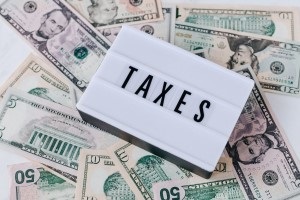Top Ten Tax Enforcement Actions of 2022

Tax fraud can take many forms, but each form results in shortchanging government coffers. More seriously, with our tax system depending heavily on taxpayers’ willingness to voluntarily file tax returns and pay taxes, tax fraud undermines confidence in the system. Enforcement of tax laws builds confidence in the system, and deserves to be a law enforcement priority.
The top tax recoveries in 2022 start with the IRS’s involvement in cryptocurrency fraud enforcement, a focus that arises from the use of digital assets as a mechanism to circumvent U.S. tax laws and the significant risk they pose in facilitating money laundering, cybercrime, and other unlawful activity. In other actions aimed directly at recovering unpaid taxes, government enforcers snared excise tax cheats, personal income tax non-filers, PPP fraudsters, money launderers, and payroll tax evaders. Cumulatively, these tax cheats will be relieved of over $120 million and will spend nearly 30 years in prison. Detailed below are the ultimately unsuccessful tactics deployed to cheat their fellow American taxpayers.
- Crypto Seizures – more than $7 billion. In February, 2022, it was announced that IRS Criminal Investigations Cyber Crime Unit led the seizure and recovery of Bitcoin valued at $4.5 billion that had been stolen during a 2016 hack of the Bitfinex virtual currency exchange. Investigators traced the stolen funds through the BTC blockchain and successfully decrypted files obtained through a search warrant. Later in the year, it was announced that the government had seized more than $3.3 billion attributable to James Zhong’s 2012 theft of over 50,000 in Bitcoin from the Silk Road dark web internet marketplace.
- Untaxed cigarette sales – $50 million. State-imposed cigarette taxes have been proven to reduce tobacco use, with significant public health benefits. In September 2022, New York State secured a significant recovery against Canada-based cigarette manufacturer Grand River Enterprises Six Nations, Ltd., and its distributor, New York-based Native Wholesale Supply Company, Inc., as the companies agreed to pay $50 million and follow corrective measures to resolve charges of evading New York state taxes. The government alleged that Grand River knew that Native Wholesale was not licensed to distribute or sell cigarettes in the state, and thus their cigarettes would not be taxed or stamped in accordance with state law, making their prices artificially lower and more accessible to young consumers.
- Willful failure to file individual income tax returns – $29.5 million, plus 5 years in prison. All U.S. citizens are required to report all sources of income, including overseas earnings. However, oil company CEO Todd Kozel, who worked in Iraq, willfully and criminally disregarded this requirement. He earned over $66 million from his work, but used sophisticated offshore structures, trusts, and bank accounts to conceal that income, and did not file returns for the compensation. Had he done so, he would have had to pay over $20 million in personal income tax. Kozel pled guilty to the charges in January 2022.
- Defrauding the IRS and the Paycheck Protection Program – >$15 million, plus 10 years in prison. The government’s financial response to the COVID-19 pandemic has been critical to the stability of the economy – and an attractive target for fraudsters. Not surprising, then, that COVID-19 fraud schemes are attracting the attention of the IRS. In this action, Quin Ngoc Rudin was sentenced to ten years in prison following his conviction on charges that he caused more than $62 million in losses to the IRS and PPP – over $19 million in losses to the IRS, and over $43 million in losses to the PPP. Rudin and a co-conspirator filed a series of false PPP loan applications, with supporting false income tax returns, on behalf of professional athletes, small businesses, shell companies, and other business entities. The government has already recovered over $15 million in fraud proceeds, and Rudin’s restitution amount remains to be ordered.
- Failure to pay employment and personal income taxes – $12.7 million, plus 24 months in prison. Employers are required to withhold income and employment taxes from employee compensation and, of course, report and pay those withholdings to the government. Failure to account for and pay employee withholding comes with significant consequences – as trucking company owner Thomas Valdez Rodriguez In managing Tom-E-Lee Trucking and a related company, Rodriguez withheld employment taxes from his employees, but then used those funds to live extravagantly, splashing out on private jets to Dallas Cowboys’ games, where he was a season ticket holder on the 50-yard line. In addition to his failures to meet his businesses’ tax obligations, Rodriguez had not paid personal income taxes since 2011. All told, the harm to the government was nearly $13 million. Rodriguez paid $1 million immediately prior to his August 2022 sentencing, and the government will continue to seek the remainder.
- Fraudulent Fuel Tax Credits – 19.5 years in prison, plus $12.3 million restitution. Michael Dexter Little – who was previously convicted of different tax fraud charges in 1999 and 2003 – again pleaded guilty to tax fraud charges after being caught filing a series of false tax returns claiming nearly $40 million in bogus fuel tax credits. Little filed the returns in his own name, in the names of co-conspirators, and in the names of identity theft victims, succeeding in obtaining at least $12.3 million in fraudulent tax refunds. Little and his fellow fraudsters then sought to launder the proceeds through real estate and other assets.
- Untaxed Other Tobacco Products – 5 years in prison, plus $10 million restitution. In another state tobacco excise tax enforcement action, this one in California, Akrum Alrahabwill spend five years in prison and was ordered to pay over $10 million for providing untaxed Other Tobacco Products to a series of individuals and businesses operating in California, resulting in over $10 million in lost excise tax revenue for the State of California. He was sentenced in June 2022.
- Failure to pay payroll taxes – over $6 million, plus 24 months in prison. The owner of pharmaceutical and medical equipment company Midwest Medical Holdings LLC, Larry Wallace Lindberg, was sentenced in December 2022 for failure to file tax returns and pay taxes on behalf of the company. Lindberg cheated the IRS out of several hundred thousand dollars per quarter in federal payroll taxes, owing more than $6 million in total. IRS collection attempts on the debt began in 2011, and Lindberg entered into several installment agreements, agreeing to make regular payments towards the tax debt. However, he defaulted. Instead of paying as he promised, he evaded collection efforts and sought to hide his assets from the IRS, including by diverting money to other entities and putting assets in the name of his children.
- Tobacco excise tax evasion – $5 million, plus 26 months in prison. TK Mac was the corporate owner of two smoke shops in Washington State. As the company’s owner, Hyung Il Kwon was convicted of conspiring to evade more than $10 million in Washington State tobacco excise taxes by purchasing tobacco products from a tribal seller and selling those products for cash without charging excise taxes to customers. To avoid detection of the high volume of cash tobacco sales, the defendants concocted a scheme for TK Mac to receive excise tax credits by creating false records to make it appear that the tribal smoke shops had purchased tobacco from TK Mac when, in fact, the entities were merely laundering money back and forth without any tobacco sales. Kwon was sentenced in January 2022 and ordered to pay over $5 million in restitution; the government had previously seized more than $5 million related to the fraudulent scheme.
- Charitable deduction and other tax fraud – $2.8 million, and 14 months in prison. Rabbi Yisroel Goldstein, who gained media attention after an attack at his San Diego synagogue in April 2019, was sentenced in January 2022 to 14 months in prison and ordered to pay $2.8 million in restitution for defrauding the IRS, several Fortune 500 companies, and multiple public and private agencies. In exchange for a 10% cut, Rabbi Yisroel Goldstein provided fake donation receipts from the Chabad of Poway that helped co-conspirators claim illegal tax deductions or pocket matching donations from their employers. He also let his brother, Mendel Goldstein, conceal income from the IRS by allowing him to deposit nearly $1 million in bank accounts belonging to the Chabad. Lastly, with co-conspirator Alexander Avergoon, the rabbi used false information and fake records to fraudulently apply for emergency funds, grants, and loans from FEMA, the California Governor’s Office of Emergency Services, and private foundations.

Annual Whistleblower Insider Top Ten Lists
Every January, Whistleblower Insider looks back at the significant government enforcement actions of the past year. Our Top Ten lists highlight the biggest recoveries and significant enforcement efforts by different government actors in cases of interest to whistleblowers.
Browse Top 10 Lists
Read More:
- How to Become an IRS Whistleblower: Answers to common questions from prospective IRS whistleblowers
- The IRS Whistleblower Program
- About tax fraud and tax underpayment
- Cryptocurrency Fraud
- How Congress and the IRS Can Fulfill the Promise of the Tax Whistleblower Program
- The Constantine Cannon Whistleblower Team
- Contact us for a confidential consultation
Tagged in: Abusive Tax Shelters, Cryptocurrency, Employment Tax Fraud, Financial and Investment Fraud, Tax Fraud, Top 10,